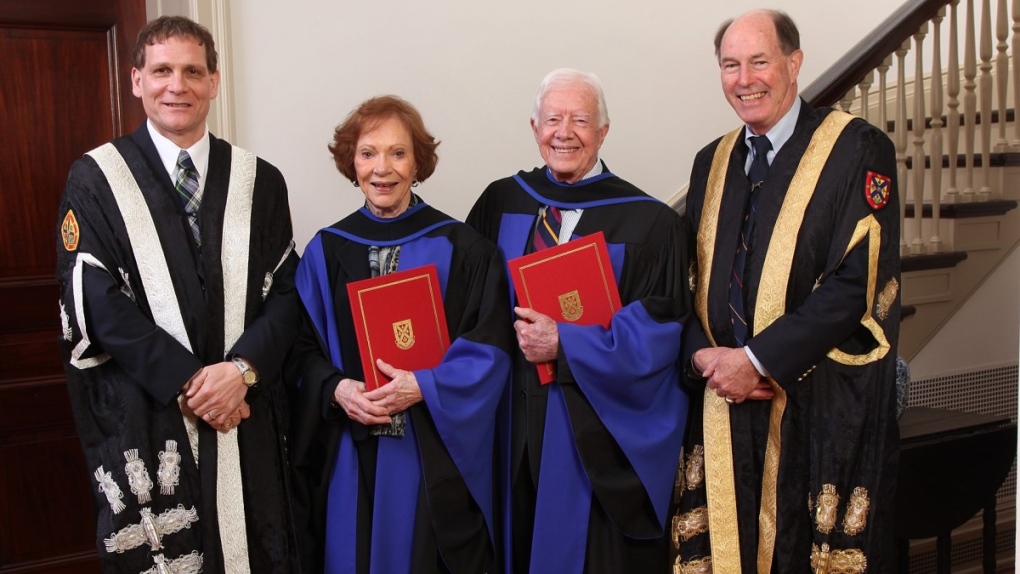Jimmy Carter helped prevent a Canadian nuclear disaster in eastern Ontario
Flags are flying at half-mast outside of the United States Embassy in downtown Ottawa following the death of former U.S. president Jimmy Carter.
- Sign up now for daily CTV News Ottawa newsletters
- The information you need to know, sent directly to you: Download the CTV News App
Carter died at the age of 100 on Sunday.
Many in eastern Ontario are remembering the time he spent in the region to help Canada avert a nuclear disaster and the "profound" impact it had on him in his political career.
Kingston, Ont. based Historian Arthur Milnes, author of the book 98 Reasons to Thank Jimmy Carter, became friends with the former president later in his life, he says.
Before going into politics, a young Jimmy Carter was a nuclear reactor officer on the USS Swordfish, which brought him to Chalk River, a town roughly 180 kilometres northwest of Ottawa. The nuclear reactor in the town suffered a serious accident and a partial meltdown in 1952.
It was the first serious nuclear reactor accident of its kind in the world.
"It was his first time that he worked with Canadians," said Milnes. "And it was a pretty important moment for both countries."
Known as Lt. James Earl Carter Jr. at the time, the 28-year-old led a team alongside Canadians to dismantle parts of the reactor. Milnes says the team practiced for weeks in a replica reactor and had just 90 seconds to unscrew a bolt because of the radiation.
Carter recounted the experience in his 1975 autobiography. Milnes says it also gave the former president a certain respect for the dangers and the positives of nuclear power that he carried with him the rest of his career.
 Jimmy Carter and Rosalynn Carter receiving honorary degrees from Queen's University in 2012. (Queen's University/supplied)
Jimmy Carter and Rosalynn Carter receiving honorary degrees from Queen's University in 2012. (Queen's University/supplied)
"He had his finger on the proverbial nuclear button," Milnes said. "So, a very profound impact."
Despite its impact, Carter was one of only two U.S. presidents since Franklin D. Roosevelt to never visit Canada while in office.
U.S. ambassador to Canada David Cohen expressed his condolences to Carter's family in a statement, remarking on his contributions to Canada.
"President Carter also had a deep respect for Canadians," Cohen wrote.
"Most notably, he publicly recognized Ambassador Ken Taylor, Canada’s former envoy to Iran, for the pivotal and heroic role he played in saving the lives of six Americans during the Iran hostage crisis."
Well-known for his humanitarian efforts after his one-term presidency, Queen's University awarded him an honorary degree for his work in 2012.
In speech notes from that day provided by Milnes, Carter spoke of Canada-U.S. relations saying: "No two counties and people could be any closer than we two – truly an international love affair that continues."
It was during this time that Carter and his wife Rosalynn stayed with Milnes in his Kingston home. The couple planted two trees in his backyard. Milnes says they now continue to grow, just like Carter's legacy.
"I still kind of find it hard to believe he's gone," he said. "But, when I consider the legacy that he, joined by Mrs. Carter, had and will have forever, I'm less sad that's for sure."
Correction
A previous version of this story said Jimmy Carter was only of only two U.S. presidents to never visit Canada while in office. This has been clarified to say he is one of two to never visit since the Franklin D. Roosevelt administration.
CTVNews.ca Top Stories

FORECAST Weather warnings issued in 6 provinces and territories
Wintry weather conditions, including heavy snow and wind chill values around -55, prompted warnings in six provinces and territories early Thursday morning.
WATCH LIVE The Latest: FBI investigating New Year's Day attack in New Orleans that killed at least 15 people
The FBI is investigating an early Wednesday attack in which a U.S. Army veteran drove a pickup truck into a crowd of New Year's revelers in New Orleans, killing 15 people. Here's the latest.
Who are Canada's top-earning CEOs and how much do they make?
Canada's 100 highest-paid CEOs earned $13.2 million on average in 2023 from salaries, bonuses and other compensation, according to the Canadian Centre for Policy Alternatives.
10 people are wounded in a shooting outside a New York City nightclub
Ten people were wounded in a shooting outside a New York City nightclub while they were waiting to get into a private event, police said.
Here's how immigration rules are changing in 2025
Canada's federal government is changing course on immigration with a wave of tighter caps on newcomers and new rules for permanent and non-permanent residents.
BREAKING Woman, father killed on New Year's Eve were victims of intimate partner violence: Halifax police
Halifax police are investigating three deaths that are connected – two of which they say were homicides resulting from intimate partner violence – in the city on New Year’s Eve.
'Dinosaur highway' tracks dating back 166 million years are discovered in England
A worker digging up clay in a southern England limestone quarry noticed unusual bumps that led to the discovery of a 'dinosaur highway' and nearly 200 tracks that date back 166 million years, researchers said Thursday.
Jocelyn Wildenstein, 'Catwoman' socialite known for her extreme cosmetic surgery, dies
Jocelyn Wildenstein, the Swiss-born socialite famous for the surgery-enhanced feline features that earned her nicknames in the American press like 'Catwoman,' has died.
opinion 7 tips to give yourself a financial restart this new year
The start of a new year is the perfect time to take control of your finances and set yourself up for success, says personal finance contributor Christopher Liew in a column for CTVNews.ca.


































